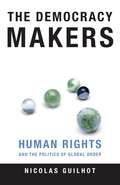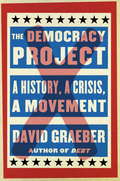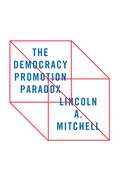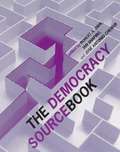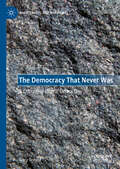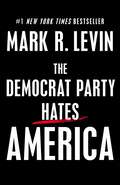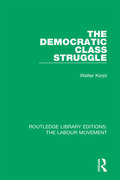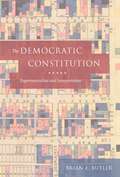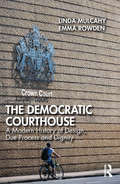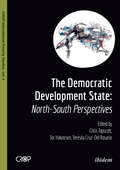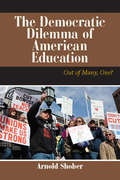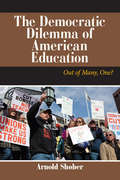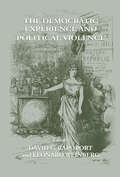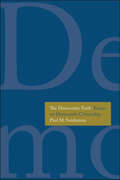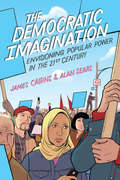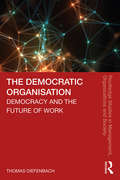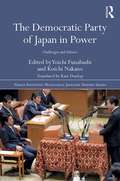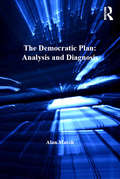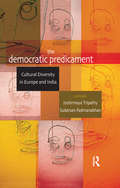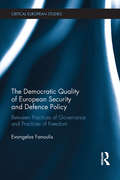- Table View
- List View
The Democracy Makers
by Nicolas GuilhotHas the international movement for democracy and human rights gone from being a weapon against power to part of the arsenal of power itself? Nicolas Guilhot explores this question in his penetrating look at how the U.S. government, the World Bank, political scientists, NGOs, think tanks, and various international organizations have appropriated the movement for democracy and human rights to export neoliberal policies throughout the world. His work charts the various symbolic, ideological, and political meanings that have developed around human rights and democracy movements. Guilhot suggests that these shifting meanings reflect the transformation of a progressive, emancipatory movement into an industry, dominated by "experts," ensconced in positions of power.Guilhot's story begins in the 1950s when U.S. foreign policy experts promoted human rights and democracy as part of a "democratic international" to fight the spread of communism. Later, the unlikely convergence of anti-Stalinist leftists and the nascent neoconservative movement found a place in the Reagan administration. These "State Department Socialists," as they were known, created policies and organizations that provided financial and technical expertise to democratic movements, but also supported authoritarian, anti-communist regimes, particularly in Latin America.Guilhot also traces the intellectual and social trajectories of key academics, policymakers, and institutions, including Seymour M. Lipset, Jeane Kirkpatrick, the "Chicago Boys," including Milton Friedman, the National Endowment for Democracy, and the Ford Foundation. He examines the ways in which various individuals, or "double agents," were able to occupy pivotal positions at the junction of academe, national, and international institutions, and activist movements. He also pays particular attention to the role of the social sciences in transforming the old anti-Communist crusades into respectable international organizations that promoted progressive and democratic ideals, but did not threaten the strategic and economic goals of Western governments and businesses.Guilhot's purpose is not to disqualify democracy promotion as a conspiratorial activity. Rather he offers new perspectives on the roles of various transnational human rights institutions and the policies they promote. Ultimately, his work proposes a new model for understanding the international politics of legitimate democratic order and the relation between popular resistance to globalization and the "Washington Consensus."
The Democracy Makers: Human Rights and the Politics of Global Order
by Nicolas GuilhotNicolas Guilhot looks at how the U.S. government, the World Bank, political scientists, NGOs, think tanks have appropriated the movements for democracy and human rights. His work charts the various symbolic and political meanings that have developed around the movement for human rights and democracy as well their strategic importance for the West. Guilhot suggests that these shifting meanings reflect the transformation of a progressive, emancipatory movement into an industry, dominated by "experts," rather than grassroots leaders.
The Democracy Makers: Human Rights and the Politics of Global Order
by Nicolas GuilhotHas the international movement for democracy and human rights gone from being a weapon against power to part of the arsenal of power itself? Nicolas Guilhot explores this question in his penetrating look at how the U.S. government, the World Bank, political scientists, NGOs, think tanks, and various international organizations have appropriated the movement for democracy and human rights to export neoliberal policies throughout the world. His work charts the various symbolic, ideological, and political meanings that have developed around human rights and democracy movements. Guilhot suggests that these shifting meanings reflect the transformation of a progressive, emancipatory movement into an industry, dominated by "experts," ensconced in positions of power.Guilhot's story begins in the 1950s when U.S. foreign policy experts promoted human rights and democracy as part of a "democratic international" to fight the spread of communism. Later, the unlikely convergence of anti-Stalinist leftists and the nascent neoconservative movement found a place in the Reagan administration. These "State Department Socialists," as they were known, created policies and organizations that provided financial and technical expertise to democratic movements, but also supported authoritarian, anti-communist regimes, particularly in Latin America.Guilhot also traces the intellectual and social trajectories of key academics, policymakers, and institutions, including Seymour M. Lipset, Jeane Kirkpatrick, the "Chicago Boys," including Milton Friedman, the National Endowment for Democracy, and the Ford Foundation. He examines the ways in which various individuals, or "double agents," were able to occupy pivotal positions at the junction of academe, national, and international institutions, and activist movements. He also pays particular attention to the role of the social sciences in transforming the old anti-Communist crusades into respectable international organizations that promoted progressive and democratic ideals, but did not threaten the strategic and economic goals of Western governments and businesses.Guilhot's purpose is not to disqualify democracy promotion as a conspiratorial activity. Rather he offers new perspectives on the roles of various transnational human rights institutions and the policies they promote. Ultimately, his work proposes a new model for understanding the international politics of legitimate democratic order and the relation between popular resistance to globalization and the "Washington Consensus."
The Democracy Project: A History, a Crisis, a Movement
by David GraeberA bold rethinking of the most powerful political idea in the world--democracy--and the story of how radical democracy can yet transform America Democracy has been the American religion since before the Revolution--from New England town halls to the multicultural democracy of Atlantic pirate ships. But can our current political system, one that seems responsive only to the wealthiest among us and leaves most Americans feeling disengaged, voiceless, and disenfranchised, really be called democratic? And if the tools of our democracy are not working to solve the rising crises we face, how can we--average citizens--make change happen? David Graeber, one of the most influential scholars and activists of his generation, takes readers on a journey through the idea of democracy, provocatively reorienting our understanding of pivotal historical moments, and extracts their lessons for today--from the birth of Athenian democracy and the founding of the United States of America to the global revolutions of the twentieth century and the rise of a new generation of activists. Underlying it all is a bracing argument that in the face of increasingly concentrated wealth and power in this country, a reenergized, reconceived democracy--one based on consensus, equality, and broad participation--can yet provide us with the just, free, and fair society we want. The Democracy Project tells the story of the resilience of the democratic spirit and the adaptability of the democratic idea. It offers a fresh take on vital history and an impassioned argument that radical democracy is, more than ever, our best hope.Praise for David Graeber's Debt "A sprawling, erudite, provocative work."--Drake Bennett, Bloomberg Businessweek "Written in a brash, engaging style, the book is also a philosophical inquiry into the nature of debt--where it came from and how it evolved."--The New York Times Book Review "Fresh . . . fascinating . . . thought-provoking [and] exceedingly timely."--Financial Times "The book is more readable and entertaining than I can indicate. . . . Graeber is a scholarly researcher, an activist and a public intellectual. His field is the whole history of social and economic transactions."--Peter Carey, The Observer "One of the year's most influential books. Graeber situates the emergence of credit within the rise of class society, the destruction of societies based on 'webs of mutual commitment' and the constantly implied threat of physical violence that lies behind all social relations based on money."--Paul Mason, The Guardian "Part anthropological history and part provocative political argument, it's a useful corrective to what passes for contemporary conversation about debt and the economy."--Jesse Singal, The Boston Globe "Terrific . . . In the best anthropological tradition, he helps us reset our everyday ideas by exploring history and other civilizations, then boomeranging back to render our own world strange, and more open to change."--Raj Patel, The Globe and Mail
The Democracy Promotion Paradox
by Lincoln A. MitchellExplore the numerous paradoxes at the heart of the theory and practice of democracy promotion. The Democracy Promotion Paradox raises difficult but critically important issues by probing the numerous inconsistencies and paradoxes that lie at the heart of the theory and practice of democracy promotion. For example, the United States frequently crafts policies to encourage democracy that rely on cooperation with undemocratic governments; democracy promoters view their work as minor yet also of critical importance to the United States and the countries where they work; and many who work in the field of democracy promotion have an incomplete understanding of democracy. Similarly, in the domestic political context, both left and right critiques of democracy promotion are internally inconsistent.Lincoln A. Mitchell provides an overview of the origins of U.S. democracy promotion, analyzes its development and evolution over the last decades, and discusses how it came to be an unquestioned assumption at the core of U.S. foreign policy. His discussion of the bureaucratic logic that underlies democracy promotion offers important insights into how it can be adapted to remain effective. Mitchell also examines the future of democracy promotion in the context of evolving U.S. domestic policy and politics and in a changed global environment in which the United States is no longer the hegemon.
The Democracy Sourcebook
by Robert Alan Dahl I. Shapiro José Antonio CheibubThe Democracy Sourcebook offers a collection of classic writings and contemporary scholarship on democracy, creating a book that can be used by undergraduate and graduate students in a wide variety of courses, including American politics.
The Democracy That Never Was: A Critique of Liberal Democracy (Marx, Engels, and Marxisms)
by Gary TeepleLiberal democracy is usually treated as an independent variable, as possessing the absolutes of democratic rule. Its variable forms, changing principles and practice, and conscious destruction by its own advocates, in particular the United States, however, suggest that it is not what it appears to be. This book argues that it is a dependent variable, the political form required by the changing configurations of national capital and their countervailing forces. The forms of liberal democracy have always shifted in concert with the mode of production as their premise. The absolutes of liberal democracy, the author contends, have never been anything but the abstracted principles of the marketplace. Their nature has now become especially visible for what they have been because the premise as national capital development has changed, leaving liberal democracy as a form without its original content, and its present content out of keeping with a national jurisdiction. As a political form, it persists, but its role has been transformed from the regulation of national capital accumulation to the enforcer of the demands of global configurations of capital. It is a role that its citizens implicitly understand, as revealed in widespread political cynicism, decreasing electoral participation, and declining legitimacy that require ever greater measures of deceit from political leaders and increased means of coercive social control, including militarized police forces and pervasive electronic surveillance. There can be no going back to the stage of national politics because the neoliberal content of liberal democratic policies represents the necessities of global capital. And it is the contradictions of global capital that define the character of early 21st century political conflict.
The Democrat Party Hates America
by Mark R. LevinINSTANT #1 NEW YORK TIMES BESTSELLER The eight-time #1 New York Times bestselling author, radio host, and Fox News star returns to the page to reveal the radically dangerous Democrat agenda that is upending American life. In American Marxism, Mark Levin explained how Marxist ideology has invaded our society and culture. In doing so, he exposed the institutions, scholars, and activists leading the revolution. Now, he picks up where he left off: to hold responsible the true malefactors steering our country down the wrong path. Insightful and hard-hitting as ever, Levin proves that since its establishment, the Democrat Party has set out to rewrite history and destroy the foundation of freedom in America. More than a political party, it is the entity through which Marxism has installed its philosophy and its new revolution. As in a Thomas Paine pamphlet or a clarion call from Paul Revere, Levin alerts his fellow Americans to the destruction this country is facing, and rallies them to defeat the threat in front of us—more looming than ever. He writes, &“Every legal, legitimate, and appropriate tool and method must be employed in the short- and long- run to defeat the Democrat Party. The Democrat Party must be resoundingly conquered in the next election and several elections thereafter, or it will become extremely difficult to undo the damage it is unleashing at breakneck pace.&”
The Democratic Class Struggle (Routledge Library Editions: The Labour Movement #22)
by Walter KorpiFirst published in 1983. This book combines a case study of class relations, politics and voting in Sweden with a comparative analysis of distributive conflicts and politics in eighteen OECD countries. Its underlying theoretical theme is the development of class relations in free-enterprise or capitalise democracies. This title will be of interest to students of history and politics.
The Democratic Constitution: Experimentalism and Interpretation
by Brian E. ButlerThe Supreme Court is seen today as the ultimate arbiter of the Constitution. Once the Court has spoken, it is the duty of the citizens and their elected officials to abide by its decisions. But the conception of the Supreme Court as the final interpreter of constitutional law took hold only relatively recently. Drawing on the pragmatic ideals characterized by Charles Sanders Peirce, John Dewey, Charles Sabel, and Richard Posner. Brian E. Butler shows how this conception is inherently problematic for a healthy democracy. Butler offers an alternative democratic conception of constitutional law, “democratic experimentalism,” and applies it in a thorough reconstruction of Supreme Court cases across the centuries, such as Brown v. Board of Education, Citizens United v. Federal Election Commission, Lucas v. South Carolina Coastal Council, and Lochner v. New York. In contrast to the traditional tools and conceptions of legal analysis that see the law as a formally unique and separate type of practice, democratic experimentalism combines democratic aims and experimental practice. Butler also suggests other directions jurisprudential roles could take: for example, adjudication could be performed by primary stakeholders with better information. Ultimately, Butler argues persuasively for a move away from the current absolute centrality of courts toward a system of justice that emphasizes local rule and democratic choice.
The Democratic Courthouse: A Modern History of Design, Due Process and Dignity
by Linda Mulcahy Emma RowdenThe Democratic Courthouse examines how changing understandings of the relationship between government and the governed came to be reflected in the buildings designed to house the modern legal system from the 1970s to the present day in England and Wales. The book explores the extent to which egalitarian ideals and the pursuit of new social and economic rights altered existing hierarchies and expectations about how people should interact with each other in the courthouse. Drawing on extensive public and private archives kept by the Ministry of Justice, but also using case studies from other jurisdictions, the book details how civil servants, judges, lawyers, architects, engineers and security experts have talked about courthouses and the people that populate them. In doing so, it uncovers a changing history of ideas about how the competing goals of transparency, majesty, participation, security, fairness and authority have been achieved, and the extent to which aspirations towards equality and participation have been realized in physical form. As this book demonstrates, the power of architecture to frame attitudes and expectations of the justice system is much more than an aesthetic or theoretical nicety. Legal subjects live in a world in which the configuration of space, the cues provided about behaviour by the built form and the way in which justice is symbolised play a crucial, but largely unacknowledged, role in creating meaning and constituting legal identities and rights to participate in the civic sphere. Key to understanding the modern day courthouse, this book will be of interest to legal scholars and students in all fields of law, sociology, political science, psychology and criminology.
The Democratic Developmental State: North-South Perspectives (CROP International Poverty Studies #4)
by Chris Tapscott Tor Halvorsen Teresita Cruz-Del RosarioThe concept of a democratic developmental state is part of the current development discourse advocated by international aid agencies, deliberated on by academics, and embraced by policymakers in many emerging economies in the global South. What is noticeable in this discourse is how little attention has been paid to a discussion of the essence of a democratic developmental state, and much of what passes for theory is little more than policy-speak and political rhetoric.This volume fills a gap in the literature on the democratic developmental state. Analyzing the different approaches to the implementation of democratic developmental states in various countries, it evaluates the extent to which these are merely replicating the central tenets of the East Asian model of the developmental state or if they are succeeding in their attempts to establish a new and more inclusive conceptualization of the state. In particular, the authors scrutinize to what degree the attempts to build a democratic developmental state may be distorted by the imperatives of neoliberalism. The volume broadens the understanding of the Nordic model of a democratic developmental state and shows how it represents an additional, and perhaps contending understanding of the developmental state derived from the East Asian experience.
The Democratic Dilemma of American Education
by Arnold ShoberThis compelling new book asks: How can American education policy be consistent with democratic ideals? Robust democracy is the combination of participation, self-rule, equality, understanding, and inclusion, but these norms can produce contradictory policy. Local control in education policy can undermine educational equality. Participation in teachers unions can improve working conditions but thwart self-rule by local taxpayers. The Democratic Dilemma of American Education draws on contemporary research in political science and education policy to offer remarkably balanced insights into these challenging issues. Expertly navigating through local, state, and federal layers of education policy, Arnold Shober examines contemporary controversies over education governance, teachers unions and collective bargaining, school funding, school choice, academic accountability, and desegregation. Shober describes the inherent practical dilemmas of current policy and the difficulties policymakers face in overcoming them to produce lasting educational reform in a democratic, federal system of government. Timely, engaging, and accessible, this is the ideal resource for courses in public policy as well as education and politics.
The Democratic Dilemma of American Education
by Arnold ShoberThis compelling new book asks: How can American education policy be consistent with democratic ideals? Robust democracy is the combination of participation, self-rule, equality, understanding, and inclusion, but these norms can produce contradictory policy. Local control in education policy can undermine educational equality. Participation in teachers unions can improve working conditions but thwart self-rule by local taxpayers. The Democratic Dilemma of American Education draws on contemporary research in political science and education policy to offer remarkably balanced insights into these challenging issues. Expertly navigating through local, state, and federal layers of education policy, Arnold Shober examines contemporary controversies over education governance, teachers unions and collective bargaining, school funding, school choice, academic accountability, and desegregation. Shober describes the inherent practical dilemmas of current policy and the difficulties policymakers face in overcoming them to produce lasting educational reform in a democratic, federal system of government. Timely, engaging, and accessible, this is the ideal resource for courses in public policy as well as education and politics.
The Democratic Dilemma of American Education
by Arnold ShoberThis compelling new book asks: How can American education policy be consistent with democratic ideals? Robust democracy is the combination of participation, self-rule, equality, understanding, and inclusion, but these norms can produce contradictory policy. Local control in education policy can undermine educational equality. Participation in teachers unions can improve working conditions but thwart self-rule by local taxpayers. The Democratic Dilemma of American Educationdraws on contemporary research in political science and education policy to offer remarkably balanced insights into these challenging issues. Expertly navigating through local, state, and federal layers of education policy, Arnold Shober examines contemporary controversies over education governance, teachers unions and collective bargaining, school funding, school choice, academic accountability, and desegregation. Shober describes the inherent practical dilemmas of current policy and the difficulties policymakers face in overcoming them to produce lasting educational reform in a democratic, federal system of government. Timely, engaging, and accessible, this is the ideal resource for courses in public policy as well as education and politics.
The Democratic Dilemma of American Education: Out of Many, One? (Dilemmas in American Politics)
by Arnold ShoberThis compelling new book asks: How can American education policy be consistent with democratic ideals? Robust democracy is the combination of participation, self-rule, equality, understanding, and inclusion, but these norms can produce contradictory policy. Local control in education policy can undermine educational equality. Participation in teachers unions can improve working conditions but thwart self-rule by local taxpayers. The Democratic Dilemma of American Education draws on contemporary research in political science and education policy to offer remarkably balanced insights into these challenging issues. Expertly navigating through local, state, and federal layers of education policy, Arnold Shober examines contemporary controversies over education governance, teachers unions and collective bargaining, school funding, school choice, academic accountability, and desegregation. Shober describes the inherent practical dilemmas of current policy and the difficulties policymakers face in overcoming them to produce lasting educational reform in a democratic, federal system of government. Timely, engaging, and accessible, this is the ideal resource for courses in public policy as well as education and politics.
The Democratic Experience and Political Violence
by Leonard Weinberg David C. RapoportAn incisive analysis of the connections between democracy and violence by acknowledged experts in the field. The connection between the two activities has often been largely ignored because of a widespread reluctance among democrats to consider the possibility that democratic forms perhaps encourage violence. This challenging volume opens up the debate.
The Democratic Faith: Essays on Democratic Citizenship
by Paul M. SnidermanCan the citizens of a democracy be trusted to run it properly? Modern political science has concentrated on cataloguing voters’ failings—their lack of knowledge, tolerance, or consistency in political thinking. While it would be a mistake to think this portrait of citizens is simply wrong, it is a deeper mistake to accept it as a satisfactory likeness. In this book, Paul Sniderman demonstrates that a concentration on the pathologies of citizens’ political thinking has obscured the intense clash of opposing belief systems in the electorate. He shows how a concentration on racism has distorted understanding of the politics of race by keeping out of sight those who think well of black Americans. And he exposes the fallacy of spotlighting the dangers of mass politics while ignoring those of elite politics.
The Democratic Horizon
by Alessandro FerraraAlessandro Ferrara explains what he terms "the democratic horizon" - the idea that democracy is no longer simply one form of government among others, but is instead almost universally regarded as the only legitimate form of government, the horizon to which most of us look. Professor Ferrara reviews the challenges under which democracies must operate, focusing on hyperpluralism, and impresses a new twist onto the framework of political liberalism. He shows that distinguishing real democracies from imitations can be difficult, responding to this predicament by enriching readers' understanding of the spirit of democracy; clearing readers' views of pluralism from residues of ethnocentrism; and conceiving multiple versions of democratic culture, rooted in the diversity of civilizational contexts.
The Democratic Imagination: Envisioning Popular Power In The Twenty-first Century
by Alan Sears James CairnsDemocracy is very much an open question in the early twenty-first century. While voter participation declines in many traditional democracies, new movements for democracy are emerging around the world. This book brings the question of democracy out of the halls of political power and home to our daily lives, pitting "official democracy" and "democracy from below" against one another in a lively debate.For more information see www.democraticimagination.com.
The Democratic Organisation: Democracy and the Future of Work (Routledge Studies in Management, Organizations and Society)
by Thomas DiefenbachPrevailing models of organisation divide people into owners, managers and employees, forcing especially the latter to obey, to behave, and to function well within a hierarchical and managerial pecking order. However, there is no natural law suggesting the need for such organisations, not in market economies and definitely not in modern democratic societies – and there is no justification for such types of organisation. Arguing that most current organisations are orthodox, hierarchical, anti-democratic, oppressive, unfair, and unjust, this book presents a viable alternative, a better type of organisation – the democratic organisation. Diefenbach develops and provides step by step a systematic, comprehensive, thorough, and detailed general model of the democratic organisation. He describes the democratic organisation’s fundamental principles, values, governance, management, structures, and processes, and the ways it functions and operates both within the organisation and towards others and the environment. Crucially, and most importantly, the democratic organisation provides the institutions and organisational context for individuals to maintain and pursue their fundamental freedoms, inalienable rights, and dignity; to manage organisations in democratic, participative, and cooperative ways; and to conduct business in considerate, balanced, and sustainable ways. This book will be of interest to researchers, academics, practitioners, and students in the fields of management, organisation studies, strategic management, business ethics, entrepreneurship, and family business.
The Democratic Party of Japan in Power: Challenges and Failures (Nissan Institute/Routledge Japanese Studies)
by Yoichi Funabashi Koichi NakanoWhen the Democratic Party of Japan (DPJ) came to power in September 2009, Japanese citizens expected the imminent arrival of a new political era, characterized by a two-party system. However, in addition to the triple disasters of March 2011, the DPJ faced numerous difficulties arising from its controversial policies and massive party defections following the government’s consumption tax hike legislation. The DPJ fell from power following a crushing defeat in the 2012 Lower House election, in which its seat total was drastically reduced.This book examines the September 2009-December 2012 administration of the DPJ from various perspectives, including policies, party governance, management, and legacy. It identifies the significance of the DPJ to Japan’s party politics, explains the reasons for its downfall, and derives crucial lessons for the future of party democracy in Japan. The contributors, a team of professional academics and a lawyer, analyse the policies and events of the DPJ administration based on their interviews with key DPJ politicians and related persons at or close to the centre of the administration. Together they elicit insights from the experiences of the DPJ government to inform the expectations of Japan’s party democracy. Explaining how the failure of the DPJ government has long-term importance for understanding Japanese politics, this book will be invaluable for students and scholars of the field.
The Democratic Plan: Analysis And Diagnosis
by Alan MarchDespite ongoing technical and professional advances, urban and regional planning is often far less effective than we might hope. Conflicting approaches and variable governmental settings have undermined planning’s legitimacy and allowed its goals to be eroded and co-opted in the face of mounting challenges. Deeper organising principles for self-understanding, action and productive critique are lacking. This book takes steps toward resolving these problems by providing a clear theoretical position to practically examine urban planning systems within democratic governance settings: the basis of planning’s legitimacy and action. Joining practical planning with political science perspectives and the work of critical theorists such as Jürgen Habermas, it directly examines urban planning as a process of governance. The dilemmas inherent to democracy are used as key organising principles and challenges for planning. Collective knowledge development and steering processes are examined as the core purposes of urban planning. Communicative planning’s grounding in the work of Habermas is revisited to develop practical ways of examining overall planning systems. This theoretical approach can be adapted to a range of planning systems and settings beyond those examined in the book, such as corporate or political realms. It is one of only a few analyses that bring together theoretical understandings and grounded and practical analyses of an Australian planning system. Conceptual and highly practical explanations of how and why the Victorian system does and doesn't ’work’ are revealed. The book demonstrates how specific placed-based understandings, and meaningful comparison between planning systems, can be made using critical theory to suggest positive change.
The Democratic Predicament: Cultural Diversity in Europe and India
by Sudarsan Padmanabhan Jyotirmaya TripathyBoth India and Europe have been undergoing a difficult process of negotiating cultural, religious and ethnic diversity within their democratic frameworks. In fact, recent incidents of xenophobic backlash against multiculturalism and minority communities in Europe, as well as myriad movements for constitutional recognition of castes, tribes and languages and the emergence of Islamophobic terror in India, question the conventional idea of democracy as the idyllic preserver of diversity. This volume contests the simplistic connection between democracy and diversity by proposing that democracy, in fact, produces, sediments and reinforces cultural heterogeneity. It argues that in democratic polities, disparate cultural practices are often converted into identity categories, with disturbing implications for national identity, constitutionalism, political governance and citizenship. While mobilizations on the plank of cultural differences are typically viewed as being born in undemocratic spaces with little toleration for diversity, they also find fertile soil in democracy insofar as democracy celebrates diversity and allows cultural dissent to thrive. Such dissent, while essential for democracy, has difficult consequences. Examining the fundamental conflict between constructions of particular cultural identities and mandates of a unifying democratic ethos, the book brings forth the complexities underlying the politics of identity recognition and national integration. In making a radical intervention in the discourse, this volume offers a critique of existing paradigms of multiculturalism. It will interest scholars and students of political science, sociology, and postcolonial and comparative studies.
The Democratic Quality of European Security and Defence Policy: Between Practices of Governance and Practices of Freedom (Critical European Studies)
by Evangelos FanoulisDue to the increase of security challenges in the proximity of Europe, the prominence of the EU's Common Security and Defence Policy (CSDP) has augmented. This book is a systematic effort to empirically approach the democratic deficit of CSDP, to understand its social construction and propose ways to remedy it. The book uses Foucault’s approach of governmentality to unravel the social construction of this deficit and to illuminate the power relations between the different actors participating in CSDP governance and the constraints upon them. Finally, applying the normative reading of agonistic democracy, the author suggests concrete ways for EU citizens to have a say in the political choices of statesmanship in CSDP governance. The Democratic Quality of European Security and Defence Policy will be of key interest to scholars, students and practitioners of EU foreign and security policy and more broadly of European governance, European Politics and democracy.
